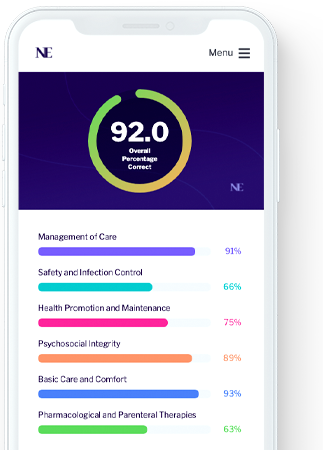Coping with Mistakes in Nursing Practice
Like all healthcare workers, nurses are human. And all nurses, from CNAs to RNs to NPs, experience various stressors in their professional and personal lives. These issues can be worsened by factors like stressful work atmospheres, high nurse-patient ratios, and sleep deprivation. The pressure of providing the best care possible for other human beings, some of whom are in a critical health condition, can also exacerbate this stress and increase the chances of making a mistake.
If a nurse has never been involved in an adverse event, they very likely will be at some point in their career. Mistakes in nursing practice can range from “near-miss” errors to those that cause significant harm or even death. Of course, nurses do not want to make mistakes, so when adverse events occur, they can feel a range of emotions like guilt, loss of self-confidence, depression, and fear. This emotional distress may lead to considerable anxiety, sleep problems, decreased job satisfaction, and in many instances, burnout.
Mistakes happen to everyone, so it’s important to be prepared when it happens to you. Keep reading for great tips to work through– and move on from– the errors that you may encounter in your nursing practice.
Keep in Mind That Mistakes Will Happen
You will invariably make a mistake at some point in your nursing career. Whether the error is small or significant, it will happen to every nurse. Here are a few things to keep in mind when you make a mistake.
- Maintain the correct perspective and approach. Remember, we are all only human, and we will make mistakes. Nurses must provide care to any number of patients at a given time and navigate their corresponding medical records, prescriptions, tests, preferences, restrictions, and other considerations. The amount of information to keep track of can be challenging.
- File an incident report as soon as possible when you make an error. Incident reports aim to objectively gather data for tracking broad-scale, systemic issues; they are not meant to be used to determine punishment for nurses who submit them. Reports are one way that mistakes can result in a positive change in your institution’s practices.
Accept Responsibility
Although it may be tempting or easy to keep quiet about a mistake, nurses must put the patient’s health and well-being ahead of pride, shame, or embarrassment.
- Recognize, then address the error. It is counterproductive to hide or blame the error on the environment or others. Although admitting fault is difficult, it is the honest thing to do. Be forthright and truthful about what occurred so you, your team, and your leaders can utilize best practices and facility protocols to resolve the error.
- Identify your role in the error. By acknowledging your part in how the error occurred, moving forward becomes easier. This allows you to see the adverse event as a teaching moment and generate any necessary positive changes to the way you work.
- Apologize to the patient, if applicable. Facing a patient and disclosing the error is better than avoiding them, and can increase the negative feelings of shame or guilt you may have.
Review the Event Objectively
It is essential to view mistakes through an unbiased lens to truly understand their root cause and work on a resolution. An objective review will help you understand your role in the event, why it happened, and what other course of action you could have taken to minimize or prevent the error.
Ask yourself these questions, answering objectively and honestly:
- How was I feeling at the time of the event?
- What caused me to make this error?
- What different steps could I have taken?
Speak with someone you trust to help you break down the sequence of events without bias, whether it’s a family member or close friend, someone on your team, or a nurse leader who you respect. The members of your team may share the errors that they’ve made. The knowledge that others have gone through similar challenges will allow you to feel a sense of normalcy and help you to process.
Reflect on Your Error, But Don’t Dwell on It
Making a mistake is a natural part of life– no one is perfect. While error events are certainly stressful, it is extremely important to forgive yourself, learn from your mistakes, and move on in your nursing practice.
- Avoid “circular thinking”. Constantly thinking about the error is counterproductive and detrimental to your personal and professional growth. It doesn’t change what has already occurred and will actually cause further anxiety and self-criticism. It’s important to identify when you are experiencing circular thinking, and then work to break out of that negative cycle.
- Try a mindfulness or meditation practice to help keep you centered and grounded, or write in a journal to organize and give shape to your anxious and stressful feelings.
- Take advantage of resources provided by your organization. Internal work support groups can be very helpful in making connections with others who have similar experiences. You might also consider attending a therapy session with a licensed professional to deal with concerns about anxiety.
- Check on your own overall physical and mental well-being. This is a chance to deliberately evaluate your work-life balance and to give yourself an opportunity to rest and recharge if you feel you need it.
The Benefits of Making a Mistake
It is completely normal to feel any number of negative emotions after you’ve made a mistake. Keep in mind, however, that a single mistake does not personally or professionally define you. Allow yourself a different perspective: Focus on using the error event as a stepping stone to move in a positive direction.
While you may not see them at the moment, error events do have potential benefits.
- Be proactive about the error. Use the event as a lesson for teaching other nurses on your team to minimize the chances of future similar errors. This also opens up the opportunity for an open dialogue in your department for improvements or positive changes that could potentially save time, money, and even lives.
- Don’t hesitate, and don’t be afraid to ask for help on a protocol or procedure. It is not unusual to feel anxious about making future mistakes. Look to a trusted nurse leader or more senior staff members to guide you appropriately. It will be a chance for them to review their own skills while role-modeling best practices. Additionally, other nurses may have the same questions, so reaching out for help can potentially benefit several members of your team.
- Seek out additional training in any areas of weakness to minimize or help prevent repeat errors. Essentially, use the error as a bridge for developing new skills to help you become a stronger, more knowledgeable, and well-rounded nurse.
Over the course of your nursing career, you will make mistakes. Do not allow them to define you; learn from them to make yourself a better nurse for the next patient.




